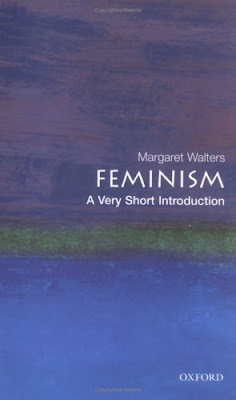Walters M (2005) Feminism A Very Short Introduction. Oxford University Press. Oxford.
Maitland S, Wandor M (1987) Arky Types. Methuen. London

Feminism: A Very Short History by Margaret Walters. This book by Margaret Walters is excellent as a short but thorough survey of feminism through history from its' religious roots right through to what she called the second-wave feminism in the late 20th century via the key moments in history such as the work of the Christian mystics of the middle ages, the Quakers and Christian social action, suffrage etc. She tackles the most significant issues in an uncluttered clearly presented way.
Her way into the work was via a survey of young people in their mid twenties who saw feminism as irrelevant because of its academic rather than practical interest, or else the attraction it has for extremists. Her arguments however are so persuasive and so honest that by the end of this short book one can only feel a sense of pride in our feminist ancestry through whom we gained education, employment. medical care, and the vote etc.
Feminism world-wide is a fascinating area of study- what women want in different countries or
what their battles are compared with western women is stark. Brazilian women reject the term feminism as eurocentric and too gender obsessed when there are more pressing local problems such as "racial violence and employment issues related to colour." Other women worldwide refer to "post-colonial feminism" which relates the ignorance of Westerners of women's lives "complicated by deep-rooted local beliefs by practices arising out of class differences, caste, religion, ethnic origins, and also by the legacy of colonialism."
At this point one hangs one's head at the shameful selfishness of the so-called developed world.
Arky Types by Sara Maitland and Michelene WandorIf any of you as puppeteers are thinking of depicting animals, then this is the book. It is essentially two feminists writers sending letters to each other about a book collaboration, in between (I have to say I did skip pages to get on with the story) there is a delightfully anarchic exchange of letters going on between Mrs Noah, the animals she is planning to put into the Ark, and the local Mrs Vicar. It is easy to spot feminist, queer and post-colonial discourse! and, of course tongue in cheek exploration of archetypes- or do they mean stereotypes? But that would not work with Noah.
Mrs Noah is building the Ark because Noah is a man and will never finish it and her teenage sons are lying in around smoking cactus leaves. Two feminist tortoises have run off refusing to get on board, accusing Mrs Noah and the human race in general of 'isms': "Of course we're in the garden and we're not coming back, no way. We've had to climb about three thousand sodding stairs (stairs are a clear example of the sort of speciesism we're complaining about) to get onto the typewriter to answer you......................................so we're not coming back .Look it's hardly worth it; all we got out of the entire Old and New Testaments was one sodding reference, and you know what to? We bet you don't, no-one bothers with tortoise cuitural history. One reference and that to say we're unclean- fucking dirtism, the Bible is full of it. ..................Let it sodding rain we say; we repudiate pro-sun anti-wet weatherism. ...".etc



